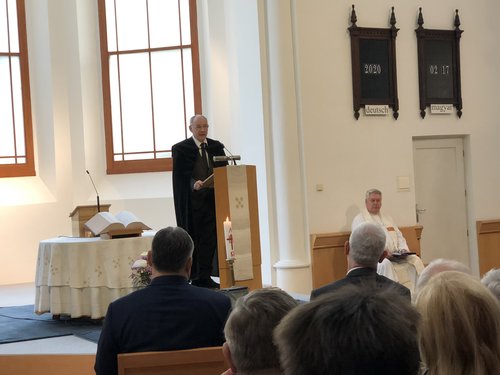Let's do the Work of Love!
2020. február 20., csütörtökBishop István Szabó, ministerial president of the Synod of RCH preached at the ecumenical prayer before the start of the spring session of the National Assembly. He reminded Members of the Parliament to do the work of love.
Members of the Parliament were invited to the ecumenical prayer that took place in the German speaking reformed congregation on the occasion of the opening of the spring session of the National Assembly. István Szabó, Presiding Bishop of the Reformed Church in Hungary gave the sermon based on the story of the encounter between Jesus and the sinful woman (Luke 7:36-50).
At the beginning of his sermon Bishop Szabó said that one has to get back two centuries in time in order to get closer to God’s liberating word. “If I had given a reflection here 20 years ago, I would have said that we had to overcome the 20th century, the destroying age of false ideologies. Today, even though only one fifth of the 21st century has passed, it is obvious that it surpass the previous one.” Referring to the historian Paul Johnson who claimed that the 20th century was a century of radical utopias, and the 21st century will be shaped by Hedonism, he noted that intellectuals played their part in both ages characterized equally by hating Christians. Utopians do so because they are constantly confronted with the admonition of Psalm 127, "Unless the Lord builds the house, the builders labor in vain.” “All plans, efforts and utopias of builders are vain, if not the Lord builds the house,” the Bishop emphasized. “Hedonists, in turn, are disturbed by the reality of sacrifice, denial and true love. They are perplexed that should love somebody else than themselves”.

Yet, the story of Jesus, Simon the Pharisee and the sinful woman speaks about the connection between forgiveness and love. Jesus was considered a prophet after ha raised the young man in Nain. This is why the Pharisee invites him to his house, and takes offense at the fact that a man considered a prophet would allow a sinner to adore him. “If this man were a prophet, he would know who is touching him and what kind of woman she is—that she is a sinner.” (Luke 7:39). “But Jesus, the prophet, knows the divine truth that the one who has the bigger debt forgiven will love more,” the Bishop continued. “Looking at our indifference and, at times, at our hostility against God, we seem to live also today as if we never had had a debt, or even God would be in debt to us. And this is a position typical for Pharisees”.
Jesus himself warned that if the Pharisees, for some reason, would not enter the kingdom of God, they would hinder those who were entering. Jesus Christ knows very well what debt means in human relationships: the debtor flees and the creditor chases him. Where there is debt, sins, something to be settled, there is everything possible, but to love one another. “Let no debt remain outstanding, except the continuing debt to love one another,” recalled the Bishop the words of Apostle Paul, pointing out that this is even more so in our relationship with God. “Jesus revealed us that everything stems from the divine forgiveness: who has the bigger debt forgiven will love more. This is the path of grace and mercy, and there is no other way for us to get close to God,” the Bishop emphasized. “Our sinfulness is the great obstruction, but it is God who solves the impossible, relieves the burden of indebtedness, resolves the hostility: solves, relieves, dissolves – embrace it! That's why Jesus came and this is the experience of everyone who follows Him.”
The Pharisee thought that if Jesus had been a prophet, he would have known who the sinful woman in reality was. Just like later the crowd, in the morning of Good Friday thought that if he had been a prophet he would have recognized who had hit him. “But Jesus was a true prophet who prayed on the cross, ‘Father, forgive them, for they do not know what they are doing'. If so, what could keep us from doing the work of love?” – admonished Bishop Szabó the congregation.
Among the many MPs present, Prime Minister Viktor Orbán and Speaker of the National Assembly László Kövér also participated in the worship.
reformatus.hu
Translation: Ecumanical Office
Contact us
Click here if you are interested in twinning.
Reformed Church in Hungary
Address: H-1146 Budapest, Abonyi utca 21.
PO Box: 1140 Budapest 70, Pf. 5
Email: oikumene@reformatus.hu
English, German and Korean language services in Budapest
Links
Recommended articles
-
Pastoral Letter in the Light of the Pandemic
Bishop Dr. István Szabó sent a pastoral letter of encouragement to the ministers serving in RCH’s congregations, expressing his gratitude for the persistence and creativity of the pastors.
-
RCH Joins in Pope's Call for Prayer
RCH published the call on congregations to join the initiative of Pope Francis, supported by ecumenical organisations, to unite in praying the Lord’s Prayer on Wednesday, 25 March, at noon.
-
English Speaking Worship Services Online
Each Sunday at 11 AM (CET) the St. Columba's Church of Scotland in Budapest, the international community of RCH invites you to join the worpship service on its facebook page.
-
Test of Humanity and Companionship
Reformatus.hu asked Dr. György Velkey, Director General of the Bethesda Children’s Hospital of RCH about the challenges of health care workers and ways of prevention against the pandemic.
-
All Church Events Suspended
In light of the coronavirus the Presidium of RCH requested congregations to suspend all church events with immediate effect. Beside restrictions, it calls for prayer, sobriety and responsibility.











